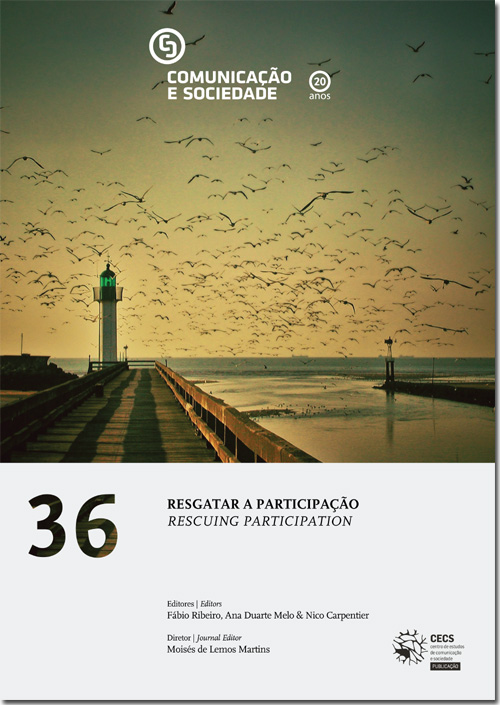The practice of mediated participation in Indonesian marginalised communities
DOI:
https://doi.org/10.17231/comsoc.36(2019).2348Keywords:
marginalised communities, media-related practices, participatory mediaAbstract
The question of participation has often been asked as an issue of degree, namely how much members of a society are allowed to have a voice in their collective life. Rather than evaluating the degree of equality reached between actors, this article attempts to identify existing practices that contextualise participation, and thus enable and constrain it. Two case studies, involving marginalised communities in participatory film production, were analysed: a community of believers in a traditional religion (penghayat) in Elu Loda and a community of people with disabilities in Salam Rejo. These communities were observed during their participation in film workshops, from October 2018 to February 2019. Fourteen participants, two facilitators, and one programme officer of the sponsor were interviewed. In addition, participants and a selection of community members who interacted with the process were invited to fill in a questionnaire designed to elicit their communicative practices in relation to storytelling, making pictures, and community meetings (Elu Loda n=49, Salam Rejo n=31). We studied how personal stories were circulated in these groups and how some individuals used the film as a channel to distribute their version of the stories, while still their collective way of storytelling was disconnected from the workshop. Second, we learned that culture shaped how certain people become more visible than the others and how these people developed skills to be more visible, which opened the door to their participation. Third, the participants’ embeddedness in their culture and community affected what aspects they were inclined to participate in and for what reason: in the workshop’s technical know-how and/or in the content.
Downloads
References
Arnstein, S. R. (1969). A ladder of citizen participation. Journal of the American Planning Association, 35, 216-224. http://dx.doi.org/10.1080/01944366908977225
Carpentier, N. (2011a). Media and participation: a site of ideological-democratic struggle. Bristol & Chicago: Intellect.
Carpentier, N. (2011b). The concept of participation: if they have access and interact, do they really participate? Communication Management Quarterly, 6, 13-36.
Carpentier, N. (2016). Beyond the ladder of participation: an analytical toolkit for the critical analysis of participatory media processes. Javnost – The Public, 23, 70-88. https://doi.org/10.1080/13183222.2016.1149760
Couldry, N., Livingstone, S. & Markham, T. (2007). Media consumption and public engagement: beyond the presumption of attention. Hampshire: Palgrave MacMillan.
Crouch, M. (2016). Legislating inter-religious harmony. Attempts at reform in Indonesia. In T. Lindsey & H. Pausacker (Eds.), Religion, law and intolerance in Indonesia (pp. 95-112). Londres: Routledge.
Dagron, A. G. (2007). Call me impure: myths and paradigms of participatory communication. In L. Fuller (Ed.), Community media: international perspectives (pp. 197-208). Nova Iorque: Palgrave MacMillan.
Dayan, D. (2001). The peculiar public of television. Media, Culture & Society, 23, 743-765. https://doi.org/10.1177/016344301023006004
Dahlgren, P. (2003). Reconfiguring civic culture in the new media milieu. In J. Corner & D. Pels (Eds.), Media and the restyling of politics (pp. 151-170). Londres: Sage.
Dahlgren, P. (2006). Doing citizenship: the cultural origins of civic agency in the public sphere. European Journal of Cultural Studies, 9, 267-286. https://doi.org/10.1177/1367549406066073
della Porta, D. (2013). Can democracy be saved? Participation, deliberation and social movements. Cambridge: Polity Press.
Evans, M., Foster, M., Corbett, J., Dolmage, E., Gervais, J., Raquel, M. & Romano, Z. (2009). Representation in participatory video: some considerations from research with métis in British Columbia. Journal of Canadian Studies, 43(1), 87-108.
Gutberlet, J. (2008). Empowering collective recycling initiatives: video documentation and action research with a recycling co-op in Brazil. Resources, Conservation & Recycling, 52, 659-670.
Jenkins, H. & Carpentier, N. (2013). Theorizing participatory intensities: a conversation about participation and politics. Convergence: The International Journal of Research into New Media Technologies, 19, 265-286. https://doi.org/10.1177/1354856513482090
Kunci Cultural Studies Center and Engage Media. (2009). Videochronic: video activism and video distribution in Indonesia. Research Report. Retirado de https://www.engagemedia.org/videochronic-english
Menchik, J. (2016). Islam and democracy in Indonesia: tolerance without liberalism. Nova Iorque: Cambridge University Press.
Mistry, J., Bignante, E. & Berardi, A. (2014). Why are we doing it? Exploring participant motivation within a participatory video project. Area, 48, 412-418.
Muhtadi, B. (2018). Komoditas demokrasi: efek sistem pemilu terhadap maraknya jual beli suara. In M. Sukmajati & A. Perdana, Pembiayaan Pemilu di Indonesia (pp. 95-117). Jacarta: Bawaslu (The Elections Supervisory Board).
Mutaqin, Z. Z. (2014). Penghayat, orthodoxy and the legal politics of the state. Indonesia and the Malay World, 42, 1-23.
Nurhasim, M. (2014). Partisipasi pemilih pada pemilu 2014: studi penjajakan. Report. Jacarta: KPU (The General Elections Commission).
Postill, J. (2010). Introduction: theorising media and practice. In B. Bräuchler & J. Postill, Theorising media and practice (pp. 1-32). Nova Iorque: Berghahn Books.
Shaw, J. (2016). Emergent ethics in participatory video: negotiating the inherent tensions as group processes evolve. Area, 48, 419-426.
Singh, N., High, C., Lane, A. & Oreszczyn, S. (2017). Building agency through participatory video: insights from the experiences of young women participants in India. Gender, Technology & Development, 21, 173-188. https://doi.org/10.1080/09718524.2018.1434993
Törnquist, O. (2013). Assessing the dynamics of democratisation: transformative politics, new institutions, and the case of Indonesia. Nova Iorque: Palgrave Macmillan.
Yüksek, D. & Carpentier, N. (2018). Participatory contact zones and conflict transformation. The participatory intensities of the Cyprus Friendship Program. Conjunctions. Transdisciplinary Journal of Cultural Participation, 5(1), 1-21. https://doi.org/10.7146/tjcp.v5i1.105286
Downloads
Published
How to Cite
Issue
Section
License
Authors own the copyright, providing the journal with the right of first publication. The work is licensed under a Creative Commons Attribution 4.0 International License.











